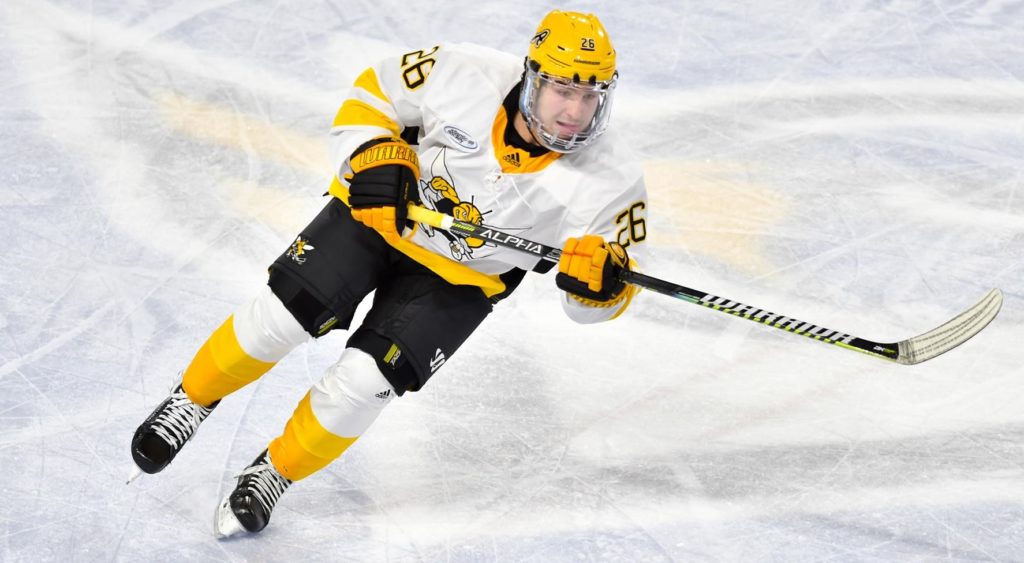
I still can’t locate Gonzaga on a map.
I know it’s in Spokane, Wash., but I honestly had no idea where that was until I fired up my Internet. One Ask Jeeves search later (you young folk have no idea what I’m talking about), and I discovered it was in the eastern part of the state, near the Idaho border. It’s 279 miles from Seattle, which is actually 80 miles longer than the distance between Fenway Park and Yankee Stadium.
If I knew nothing else about Gonzaga, I would still be able to have a discussion about the university because I’m a huge college basketball fan, and the Bulldogs are the shining example of success for most mid-major programs. They are, this year, the consensus No. 1 team in the nation and a team with appearances in each of the last 21 national tournaments, a streak that stretched to 22 when they won the West Coast Conference postseason tournament last week.
It’s almost mystical how often the team wins 25 games, and it’s why Gonzaga is a national standard.
Gonzaga has almost nothing in common with AIC. Yet when I asked Eric Lang about his third consecutive regular-season Atlantic Hockey championship, the Yellow Jackets head coach drew a direct line into the comparison.
“Our guys embraced, initially, that underdog role,” Lang said. “And I think that has morphed and transformed itself into the fact that we wanted AIC to be a hockey destination. There’s not a lot of people that knew where Gonzaga was, but there’s a lot of people that know that they’ve got a really good basketball team. That’s the goal here for AIC.
“They might know that there’s this little school in Springfield, Massachusetts, but that school has a pretty good hockey team. We’re pretty proud of that.”
Like Gonzaga, it doesn’t take much to recognize the Yellow Jackets as a prohibitive conference favorite. They enter the Atlantic Hockey quarterfinals as the No. 16 team in the nation, and their No. 1 seed is their third consecutive regular season conference championship. They hold home ice advantage through the entire postseason by virtue of an 11-1 league record, and their .889 winning percentage broke an 11-year record for best finish by a first place team.
The previous record, set in 2009-2010, was the only time in league history that the champion – RIT – advanced to a Frozen Four.
It has the Yellow Jackets positioned as a certified megalith and a near-lock for the NCAA tournament, even as an at-large bid, as the playoff quarterfinals return to the MassMutual Center on Friday. They rank seventh in the Pairwise Rankings, which are mostly informal this year, and only dropped one slot after last weekend despite still remaining idle.
Yet there’s still doubt hanging over the team as it enters its quarterfinal bid because AIC hasn’t played since January 30. It swept Holy Cross with consecutive shutouts and a 9-0 aggregate score less than two weeks after it clinched a 1-0 win over the Crusaders. In between those three games stood Sacred Heart’s two-goal outburst and the only time an Atlantic Hockey team scored more than one goal against the Yellow Jackets, but the bees’ snowman gave them an 8-2 decision. It was part of a larger, five-game winning streak that had them streaking towards the top-10 in the national poll.
That’s when the schedule went a little sideways. COVID-19 cancellations and postponements put AIC on the back burner, even though no team caught the Yellow Jackets atop the league table. Days turned into weeks, and the cannibalization within the division first clinched a bye under the new postseason format, then the league championship.
Forty-one days in total stretched between game days, and AIC didn’t even know its opponent this week until Tuesday night’s Bentley-Air Force decision.
“We’re kind of sick of practicing against each other,” Lang joked. “As coaches, we tried to be creative to make sure we’re playing a good amount of small games and have some intrasquad scrimmages. We really focused on our skill and making sure we’ve got our legs underneath us. We’re in uncharted waters, where we had a plan, ripped it up and made a new plan. We won five in a row, but we went six weeks without playing a hockey game. So we can’t look at a week where we didn’t play.
“Everything is just about what’s in front of us, and what’s in front of us has been having a good day of practice. That’s what we focused on.”
It’s an internal mentality built by a team with postseason experience. AIC is two years removed from its win over St. Cloud State in the first round of the NCAA Tournament, but it never missed a beat in winning last year’s regular season championship. It’s a new tradition and a new day for the team, which enters the postseason with both the sixth-best scoring offense and the sixth-best scoring defense in the country.
“It will always be about how we need to play the game,” Lang said. “We talk about a ‘Game Seven’ mentality, and that’s the way we traditionally play. We prep for playoff games in October, and not much is going to change about how we play. We do heavy, heavy deep dives into our potential opponents, and we’re going to be unbelievably prepared for anyone. We’ll make sure that our game plan is ready to go over the next couple of days.”
At the end of the day, it’s a new Massachusetts hockey tradition and one that the bigger schools might not recognize. AIC is a small, Division II school in Springfield and is neither the flagship state institution nor the team representing the big city metropolis in Boston. It is, though, a powerhouse akin to a team representing the Pacific Northwest that embraced its tradition and turned its sport on its head.
“We embraced our past and all that (former head coach) Gary Wright did, what he meant to the program – we are the ‘Little Engine That Could,’” Lang, who played for Wright, said. “Four years ago, we talked about writing a script that nobody else in the country was able to write.”
Playoff picture, outlined
Atlantic Hockey maintained its best-of-three format for this week’s quarterfinal series, which means the matchups this weekend require two wins between Friday and Sunday in order to determine which teams advance to the semifinal round.
That’s no different than any other year even though it operates within the pod-based, divisional structure. Out east, top-seeded AIC hosts Bentley and second-seeded Army West Point hosts Sacred Heart, while No. 1 seed Robert Morris hosts Niagara and third-seeded RIT visits No. 2 Canisius in the west.
How those series end will subsequently determine next week’s conference championship weekend. The top remaining eastern team will play off against the lower-seeded western team in – and vice-versa – in the single elimination semifinals with the games taking place at the site of the best remaining team.
That means a couple of things. First, the east has hosting rights in both of its top seeds because AIC and Army West Point finished first and second in the 11-team standings. The Yellow Jackets have home ice advantage throughout the postseason, but a loss to Bentley this weekend sends the championship rights to the Black Knights.
The only way the playoffs shift west is if Sacred Heart and Bentley both win their series. That sends the championship to Robert Morris unless Niagara clinches an upset in Pittsburgh. If that happens, the winner of the RIT-Canisius series automatically hosts as the highest remaining team.
I gave myself a little bit of ironic chuckle because after pulling the tournament from HARBORCenter, Canisius could conceivably still wind up hosting with a very direct route.
Playoff matchups, analyzed
I couldn’t be more excited about the matchups or intrigue in this year’s playoff, and the new format will deliver on the promised drama of regional rivalries.
I’ll start with the AIC-Bentley matchup occurring one year after COVID-19 canceled last year’s quarterfinal series. It’s the one series I genuinely felt robbed off – Bentley allegiance aside – because of the deep roots between the two schools. They’re Northeast-10 rivals in Division II and are separated by less than two hours’ driving distance. Last year’s midseason series was a turning point for Bentley. In their only meeting this year, AIC won, 4-1, on the road before it earned a 3-1 victory at home in December.
That will run opposite another powerhouse matchup between Sacred Heart and Army West Point. Both teams earned byes last year but never played their respective postseason series, but it’s their first time seeing each other in a playoff since 2015’s Black Knight sweep. Army was one of the lone sides to play in the last weekend of the regular season, and its two-game sweep over Long Island University extended the nation’s longest unbeaten streak to 11 games.
The Black Knights, like AIC, are playing for their postseason lives and enter this weekend seeded 14th in the Pairwise Rankings. It’s worth noting that during the unbeaten streak, the one game that wasn’t won in regulation was against Sacred Heart, though the Black Knights won in a shootout as part of four straight wins over the Pioneers.
Out west, pod champion Robert Morris hosts Niagara while hunting for its seventh consecutive Atlantic Hockey semifinal berth, a streak that was not broken last year when the Colonials beat Holy Cross to advance to the cancelled quarterfinal. Since joining the league in 2010, RMU hasn’t lost a best-of-three series at home, and the team won its four matchups this year over Niagara, though the Purple Eagles pushed two of those games to overtime. This is their first meeting in the Atlantic Hockey postseason since 2015 and just their third meeting since the end of the College Hockey America era.
The winner of that series draws either RIT or Canisius in a year that’s been strange for both teams. The Tigers rallied from their school’s initial opt-out to win nine games and earned a first round bye in their last series by sweeping Robert Morris. It occurred one week after a sweep loss at Canisius, which were the second and third games for the Golden Griffins after returning from a second pause.
The Griffs, for what it’s worth, gained steam once they were on the ice more consistently. After playing two games in the 2020 portion, they ripped off four in a row over Mercyhurst and RIT and took four points from Air Force and Niagara. This is their first meeting since the 2015 AHA semifinals in Rochester.
One year later
This week marked one year since the World Health Organization declared COVID-19 a global pandemic.
I will never forget watching my social media feed systematically shut down the sports world that week, and the surreality is one of those things I can’t shake, not even after we returned to sports. Somewhat ironically, I received word of that first domino – the Ivy League – while preparing to broadcast women’s lacrosse at Brown. Everything slowly eroded from there until I was watching eNASCAR on the couch.
Following hockey’s shutdown, I wrote about my feelings and of how my heart broke for the people. I discussed my vision for the eventual return to the rink, and I dreamed of the Frozen Four celebration once we could safely gather again. That obviously won’t happen to a degree this year, but I can still close my eyes and envision the fast-approaching celebration of players and coaches on the ice.
I relived most of that this week. COVID-19 is still very much a part of our lives, and this year, maybe more than any other year, has been particularly difficult to navigate. I empathize with students, coaches, staff members and everyone else involved, and I feel for the human toll that stretches well beyond a positive test case. The isolation and fear, the unknowns of this season – I know it has to have taken an exceptional toll on everyone’s mental wellness.
There have been times where the cancellations and postponements impacted me, and I wasn’t in the weeds in the same way as players, coaches, trainers, team doctors, staff members and a million other people I forgot to mention.
It’s why I’m so grateful to have this sport and the people within it. Everyone made this possible, especially those who helped me broadcast and write from my couch while my wife developed a small human that will join the world in a few short weeks. The commitment to see this through was a Herculean task, and it all happened while staring down an ongoing pandemic.
I can’t emphasize that enough, and I can’t thank or congratulate everyone enough for trying to make this year happen. You all deserve the honor of finishing what you started on the ice, and I hope everyone receives that opportunity. Knowing that it didn’t happen for Holy Cross, I feel especially for those players and coaches who sacrificed and dedicated themselves to the program.
With that in mind, I’ll leave formal thank yous to Chris Lerch, who I am incredibly grateful to have back for this second half and championship road. I consider him my hockey brother, and I will never take for granted having the opportunity to just send a text with some whimsical hockey statement.
So I’ll leave everyone with two last statements. First, don’t be afraid to tell people how much you care about them. That level of kindness can break the walls of isolation when you have a conversation at an individual level. It keeps relationships up to date, and even though we dilute the word “love” sometimes, we shouldn’t be afraid to use it.
Second – never stop believing. Yeah, it sounds like a Journey song, but positive energy is contagious for people at their lowest points. I wrote last year about how we would celebrate as a hockey community. We will crown a champion, and we will celebrate from afar. The day when we all congregate together in full barns will be beautiful, and I know they will happen again. I missed crowds and fans this year, but I would have missed the games more.
Tomorrow isn’t guaranteed, so believe in today. But that said, never, ever stop believing that we can make tomorrow a better day if we simply believe in what we’re doing today.
Until we meet again, I wish you all nothing but good health and well-being.


